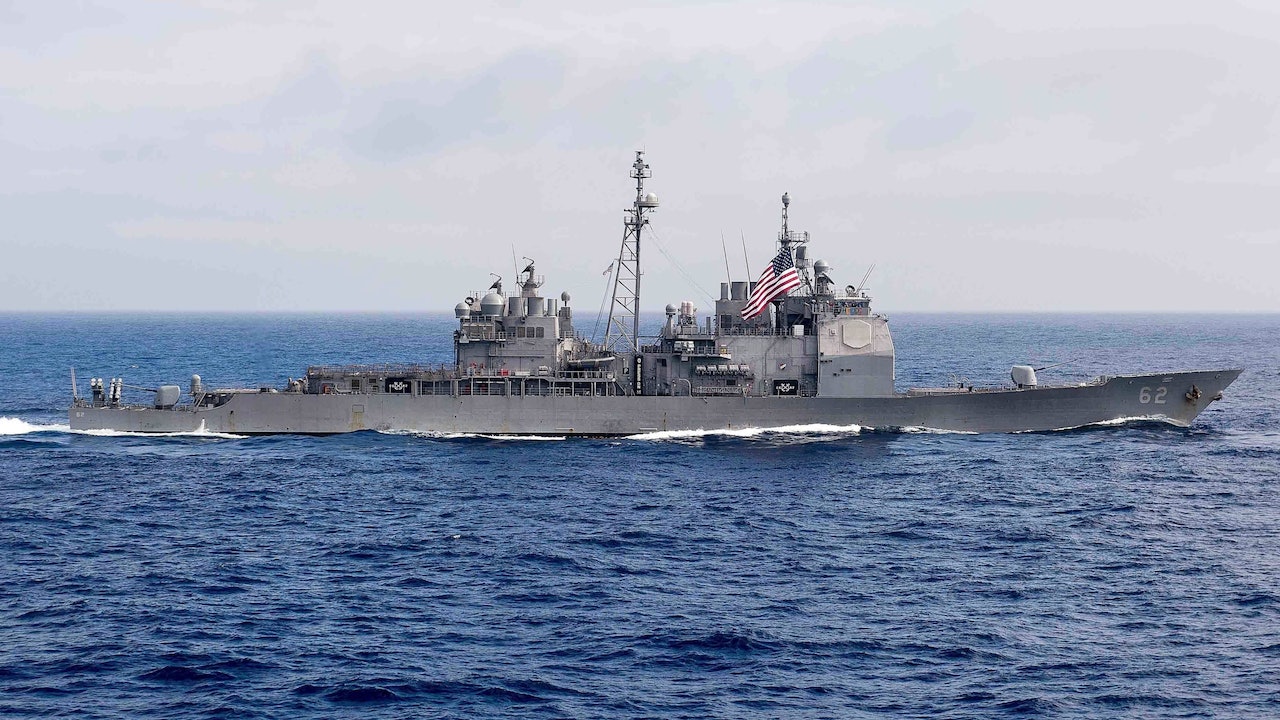The effects of the US House of Representatives Speaker Nancy Pelosi's visit to Taiwan continued to ferment.
After the People's Liberation Army "round-the-island military exercise" around Taiwan's six major regions, the Western joint military exercises have been carried out frequently.
The cruisers USS Antietam and USS Chancellorsville have crossed the Taiwan Strait.
At the political level, China's military intimidation against Taiwan has made the US Congress more consistent in its bipartisan stance against balancing China and supporting Taiwan. Currently, in the Taiwan-related bill in Congress, the Senate Foreign Affairs Committee has scheduled the "Taiwan Policy Act of 2022" to be heard in September. Most notably, this legislation aimed at "reconstructing" US policy toward Taiwan is considered by some Chinese scholars to directly challenge the basis for the establishment of diplomatic relations between the US and China, and China will surely respond more strongly than Pelosi's visit to Taiwan.
Frankly speaking, no matter how loud the voices on the Internet are, judging from the situation of Pelosi's visit to Taiwan, China and the United States "play against each other", it is an obvious fact: at this point in time, neither China nor the United States is willing to fight for the Taiwan Strait.
The United States does not want to fight a "preventive war" with China by instigating Taiwan's independence; and the Chinese side has no desire to go to war immediately and unify Taiwan by force.
Mainland China has gained a lot of practical benefits this time.
Militarily, military planes and warships not only crossed the middle line of the strait, but also approached unprecedentedly to be only tens or even ten kilometers away from Taiwan's main island; missiles flew over Taipei.
But the most important thing is to test the bottom line of Taiwan and the United States.
Under such circumstances, the Taiwan military did not dare to take drastic countermeasures.
The Eastern Theater also stated that similar combat readiness patrols in the direction of the Taiwan Strait will be normalized.
This time, the Taiwanese army does not dare to confront the approaching cruise, and it will not dare to confront it after normalization in the future.
As for the United States, it is clear that it "hides far away". During the entire exercise, it has no intention to support Taiwan through military support.
This also reflects the attitude of mainstream American politics.
In handling Pelosi's visit to Taiwan, Beijing showed great restraint, weighed the pros and cons of military action, and finally gave a set of "combination punches", but it did avoid direct confrontation between China and the United States at this time.
In fact, the Pentagon must also be closely watching Beijing's actions and judging Beijing's decisions.
The strategy of both sides is "cutting sausages" - on the basis of not destroying the current status quo on both sides of the Taiwan Strait, squeeze the other side's space forward, test the other side's bottom line, in order to obtain more benefits and gain greater initiative in the future game right.
The U.S. side will inevitably continue to make moves to test the bottom line.
For example, the "2022 Taiwan Policy Act" to be heard by the Senate in September makes new provisions on Taiwan's diplomacy, economy, education and other fields. Almost everything can be regarded as "pro-independence" measures. The bill has already touched China's bottom line, and if it is passed, it will be met with a strong backlash from China.
So, what will Beijing do?
Avoiding direct confrontation does not mean that you are not ready for confrontation.
If the US touches the line again and again, will it force an early showdown between China and the US?
On August 3, Pelosi, who visited Taiwan, met with Tsai Ing-wen.
(AP)
First of all, understand, what is a showdown? A showdown doesn't have to be a war.
If the contradictions between the two sides are irreconcilable, and one of the parties believes that in order to achieve their goals, it can take the risk of severing relations or even war between the two countries, then there will be a showdown between the two countries.
In a showdown, if both sides are unwilling to compromise, war could ensue.
Then we need to ask, have China and the United States reached a point where "in order to achieve their goals, they can risk severing relations or even war between the two countries"?
It is inevitable that both China and the United States will be in a period of structural conflict in the next 20 to 30 years.
Its nature is not "essentially" different from the tension of the Cold War and the Thucydides Trap, so of course the possibility of military conflict cannot be underestimated.
This must be clear.
However, the reason why China-US relations are described as a "new cold war" is that the structural contradiction between China and the US stems from the distrust and hostility of the "big one" to the rising "second child"
: the West still lives in a power game pattern as the dominant ideology. In the political structure, this power structure can easily evolve into a conflict of power; it is also because the rise of emerging countries will inevitably change the existing order.
This is the same as the United States, the Soviet Union, Britain, Germany, Britain and Spain in history. The original strategic layout, military, political, and economic interests have been challenged.
Taiwan Navy Exercise: On August 4, 2022, CCTV released a picture of the military exercise and missile launch on the 4th (CCTV via AP)
However
, the differences between Sino-US relations and the "Thucydides Trap" are
: First, globalization after World War II introduced changes in all kinds of traditional relations, which are still going on.
None of the precedents has the close interweaving of economy, trade, society, and technology as today's China and the United States, and there is no symbiotic relationship that is "mutually beneficial and difficult to give up" today;
Second, outside the two countries, the global economic layout has also been closely linked, and "seeking consensus through peaceful means while recognizing differences" has become a generally accepted principle internationally - although the United States is still a die-hard.
This also means that wrapping the current Sino-US relationship with the "Thucydides Trap" - in fact, is now described by global public opinion - will make it easier to label China and the United States as "there must be a war", and even fall into Self-hypnosis and self-actualization.
The essence of Sino-US relations is "contradiction" and "mutual interests".
There are contradictions and fear of contradictions; benefits are gained and benefits are lost; both direct benefits and indirect or environmental benefits; both direct damage and indirect or environmental damage.
How to manage the multi-layered relationship pattern between the two relationships of "contradiction" and "mutual interest" is the role of mutual growth and mutual restraint.
If the factor of "conflict and conflict" is higher than "mutual interest", then the disputes, friction and hostility between the two countries will increase, and vice versa.
These two factors have always existed in Sino-US relations, but they are constantly changing their priorities, interacting with each other, and resonating inside and outside.
This is actually the Sino-US relationship in our reality.
U.S.-China relations: The picture shows a video meeting between U.S. President Joe Biden (left) and Chinese President Xi Jinping (right) on a TV in a mall in Beijing, China, on November 16, 2021.
(Getty)
In recent years, the gap in comprehensive national strength between China and the United States has further narrowed. China's development stage determines that it will increasingly go global and hold more and more rule-making power. Chinese enterprises have gradually formed a dominant position in various industries, and even formed an absolute leading position in some industries. As a result, the "contradiction and conflict" factor between China and the United States obviously outweighs the "mutual interest". With Trump coming to power in 2017 and launching a trade war with China in 2018 as a sign, the two countries have entered a new stage, and frictions have become more and more frequent. more intense.
Even the argument that "China and the United States cannot escape a war" has become less alarmist.
Then the sudden outbreak of the new crown epidemic, China is the only major economy in the world to achieve growth in the year when the new crown epidemic raged.
This makes America even more nervous.
Therefore, after Biden took office, he not only continued the Trump administration policy, but also further positioned China as "the most serious long-term challenge".
, He also accelerated the pace of the Indo-Pacific strategy, replaying the alliance strategy he is most familiar with, and building an "anti-China alliance".
It makes the outside world even more believe that the storm between China and the United States is about to come.
Based on this basic understanding, let's try to think again, when will China and the US showdown?
War is the continuation of politics and the ultimate means of solving political problems.
The showdown is also a continuation of politics.
Why would a country want a showdown?
It must be that the problem cannot be solved by other political and economic means, and it must be solved by means of war.
China's goal is very clear, that is, to rise.
To meet the people's ever-growing needs for a better life, the country must obtain a political and military status commensurate with its national strength.
At present, China is undoubtedly facing all kinds of problems, political, military, and economic, which must be solved step by step and continued to develop.
Is it impossible to solve the problem by peaceful political means today?
Has China's economy reached the point where it will not be able to advance to a higher level without a showdown?
Apparently not by this time.
In recent years, in the context of changes in the international landscape and the balance of power between the old and the new, the US exaggerates China's strength and emphasizes that China will "dominate the world". Important reference.
(Getty)
In fact, the same is true in the United States.
If the U.S. is confident that it can contain China without a showdown, the U.S. also doesn’t want to risk a showdown with war.
However, in recent years, in the context of changes in the international landscape and the balance of old and new power, the US exaggerates China's strength and emphasizes that China will "dominate the world". important basis for policy.
It has always been a trick of the United States to create an opponent by concocting "phobias" and then suppress it.
But this time, whether to "create an adversary" with China, or whether the "discomfort" with China has reached the point of "fear", will have a direct impact on how the United States will act.
In fact, as long as both countries maintain a high degree of system confidence and road confidence.
The more confident the two countries are, the further the showdown will be.
In the "Thucydides Trap", either of the two countries that are unwilling to surrender to the other loses self-confidence, and a showdown or even war is not far away.
Fear of future decline is the reason why a country chooses war in the game of great powers.
Xi Jinping may attend the SCO summit after his visit to Kazakhstan: Why did Dukin, who once advocated "splitting China", start to advocate a "China-Russia alliance" this year?









